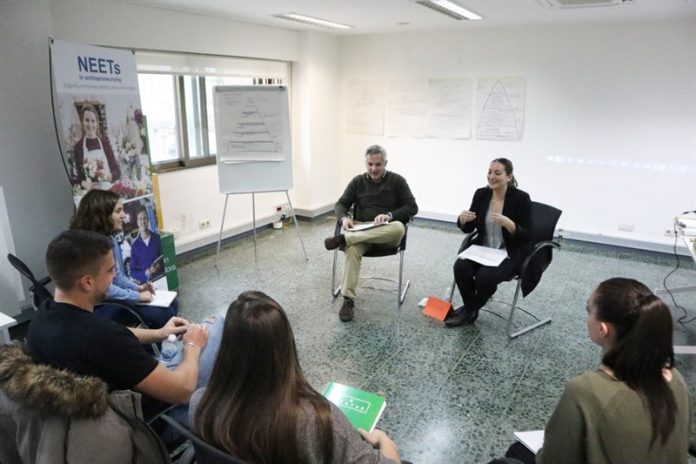
How can we find young people who are currently not in education, employment or training? This is one of the key questions that Manager of Educational Entrepreneurship Programmes – Javier Samarán and his colleagues at JA Spain are facing since the new coronavirus outbreak.
The truth is that NEETs (or ninis, in Spanish) are rather difficult to reach. To ensure that more young people can benefit from its programmes, JA Spain collaborates with partners that help find these youngsters and implement the activities. But with many of them now focused on providing social assistance and relief, the project NEETs in Entrepreneurship has gone through some adaptations in the light of the pandemic.
Firstly, the Foundation has launched a series of online initiatives and partnered with other organisations already working with this target group. One of them is CEXT, which has a programme for young Spanish people who went abroad and gives them a chance to continue learning online. In addition, JA Spain works with NGOs such as La Rueca or Fundación Senara, and with the VET study centre ITEP to train students for specific labour markets. Students that will graduate in May or June and who will not continue their studies or who do not have a job lined up are given the chance to keep learning about entrepreneurship or to follow courses to help them get into the job market. “The positive thing” – explains Javier – “is that even if now we cannot do the face-to-face activities we had planned, we are reaching students from different parts of Spain. The absence of physical barriers allows us to help NEETs all over the country”.
Secondly, the scheduled trainings have been reorganised as most activities before COVID-19 were happening face-to-face, with JA Spain being directly responsible for delivering about 90% of the trainings. The new situation has brought more opportunities for collaboration between the non-profit and the private sector to help improve the situation of NEETs, allowing the organisation to contact volunteers who are keen to make a better future for students. “The companies have been very generous and responsive when we have asked them to provide mentors to cover specific areas of our programmes, which is fantastic”.
Miryam Díaz, who works as a Programme Coordinator, sees the disruptions also as an opportunity to reach new young people. “We had to cancel the workshops that we had planned weekly and some individual mentoring sessions or visits to companies. However, doing webinars has allowed us to make our activities known to more NEETs while engaging with more companies, so there are good aspects too”.
Organisations like the Citi Foundation, EY or FedEx help with the implementation of these online trainings. “We build bridges between young NEETs and the companies by letting the volunteers take care of some of the activities. In turn, this is helping us a lot as the participants are very interested in the companies, in getting to know more about how they work and what they do”, says Javier.
Even before the COVID-19 crisis, there were almost 1,000,000 ‘ninis’ in Spain (December 2019), with the country having one of the highest percentages of students dropping out of school before finishing secondary education. The economic aspects of the pandemic are expected to hit young people particularly hard; therefore, providing them with training and support to get into the labour market is crucial.
“We are quickly realizing” – explains Javier – “that one of the problems is that these students do not like how the current educational system is structured, so they quit. What we need is very specific formation to get them back into the system. Most of them are very smart and qualified, young people that are just looking for a first opportunity”. The NEETs in Entrepreneurship project helps them boost their self-confidence by providing guidance and focusing on their main aptitudes. “If you listen to these kids and give them a chance, if you train them and you insist on the things that they do well instead of on the things that they do wrong, you can get the best of them”.
All-in-all, the response from NEETs has been very positive and only in the month of April about 50 young NEETs from Madrid and other cities followed the trainings. In addition, more than 15 volunteers have been involved in the activities. For the next months, JA Spain is confident that the number of participants will increase thanks to new trainings on employment and entrepreneurship, alongside other formats such as online innovation camps that will allow for more interaction. Several workshops are planned to cover the skills and competences required to enter the labour market – designing an attractive CV, doing interviews online or managing social media – as these skills are highly valued by young people.

